Analysis of Accounting Ethics Violations and Recommendations Report
VerifiedAdded on 2021/06/17
|9
|1808
|21
Report
AI Summary
This report, titled "Accounting Theory and Contemporary Issues," examines ethical violations in accounting through two case studies: a professional scenario involving an audit firm and a student scenario concerning academic integrity. The report analyzes violations of PCAOB auditing standards and institutional ethical codes, assessing the impact on stakeholders such as investors, audit firms, universities, and students. It explores the rationalizations of the individuals involved, offering recommendations for corrective actions and emphasizing the importance of ethical conduct and adherence to professional standards. The report also addresses the reasons behind the silence of the individuals involved and proposes measures for ethical decision-making and reporting of misconduct. References to relevant literature support the analysis.
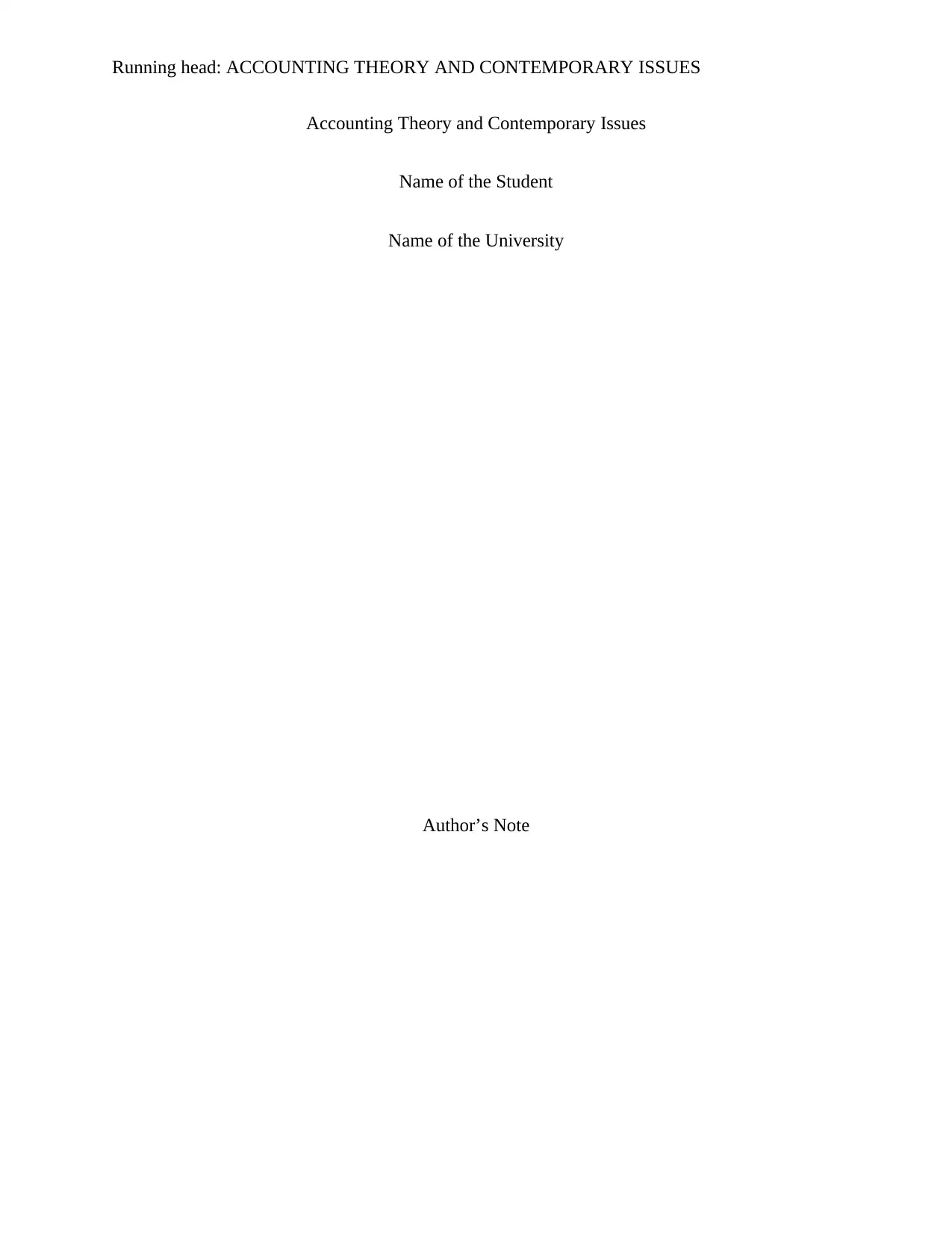
Running head: ACCOUNTING THEORY AND CONTEMPORARY ISSUES
Accounting Theory and Contemporary Issues
Name of the Student
Name of the University
Author’s Note
Accounting Theory and Contemporary Issues
Name of the Student
Name of the University
Author’s Note
Paraphrase This Document
Need a fresh take? Get an instant paraphrase of this document with our AI Paraphraser
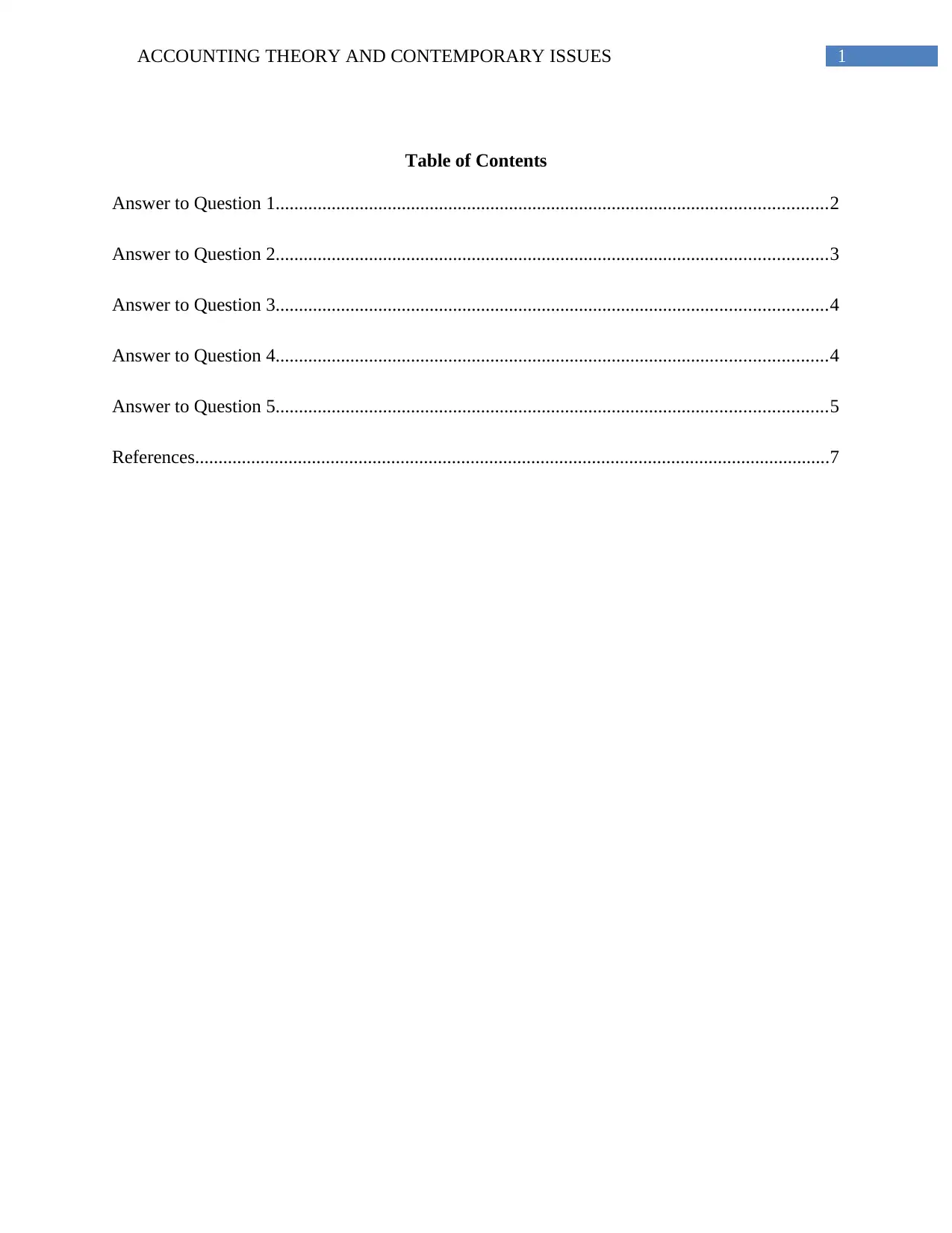
1ACCOUNTING THEORY AND CONTEMPORARY ISSUES
Table of Contents
Answer to Question 1......................................................................................................................2
Answer to Question 2......................................................................................................................3
Answer to Question 3......................................................................................................................4
Answer to Question 4......................................................................................................................4
Answer to Question 5......................................................................................................................5
References........................................................................................................................................7
Table of Contents
Answer to Question 1......................................................................................................................2
Answer to Question 2......................................................................................................................3
Answer to Question 3......................................................................................................................4
Answer to Question 4......................................................................................................................4
Answer to Question 5......................................................................................................................5
References........................................................................................................................................7
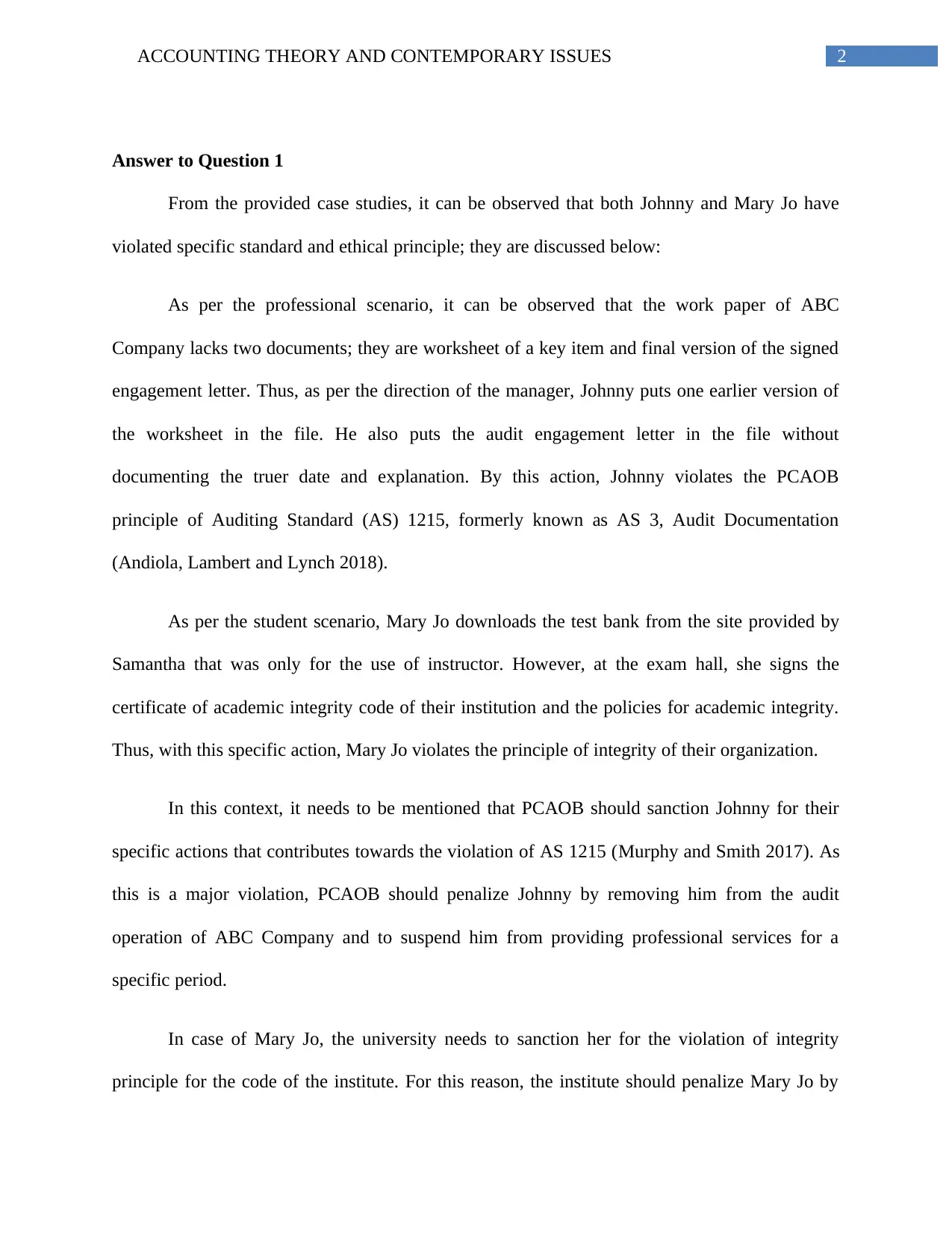
2ACCOUNTING THEORY AND CONTEMPORARY ISSUES
Answer to Question 1
From the provided case studies, it can be observed that both Johnny and Mary Jo have
violated specific standard and ethical principle; they are discussed below:
As per the professional scenario, it can be observed that the work paper of ABC
Company lacks two documents; they are worksheet of a key item and final version of the signed
engagement letter. Thus, as per the direction of the manager, Johnny puts one earlier version of
the worksheet in the file. He also puts the audit engagement letter in the file without
documenting the truer date and explanation. By this action, Johnny violates the PCAOB
principle of Auditing Standard (AS) 1215, formerly known as AS 3, Audit Documentation
(Andiola, Lambert and Lynch 2018).
As per the student scenario, Mary Jo downloads the test bank from the site provided by
Samantha that was only for the use of instructor. However, at the exam hall, she signs the
certificate of academic integrity code of their institution and the policies for academic integrity.
Thus, with this specific action, Mary Jo violates the principle of integrity of their organization.
In this context, it needs to be mentioned that PCAOB should sanction Johnny for their
specific actions that contributes towards the violation of AS 1215 (Murphy and Smith 2017). As
this is a major violation, PCAOB should penalize Johnny by removing him from the audit
operation of ABC Company and to suspend him from providing professional services for a
specific period.
In case of Mary Jo, the university needs to sanction her for the violation of integrity
principle for the code of the institute. For this reason, the institute should penalize Mary Jo by
Answer to Question 1
From the provided case studies, it can be observed that both Johnny and Mary Jo have
violated specific standard and ethical principle; they are discussed below:
As per the professional scenario, it can be observed that the work paper of ABC
Company lacks two documents; they are worksheet of a key item and final version of the signed
engagement letter. Thus, as per the direction of the manager, Johnny puts one earlier version of
the worksheet in the file. He also puts the audit engagement letter in the file without
documenting the truer date and explanation. By this action, Johnny violates the PCAOB
principle of Auditing Standard (AS) 1215, formerly known as AS 3, Audit Documentation
(Andiola, Lambert and Lynch 2018).
As per the student scenario, Mary Jo downloads the test bank from the site provided by
Samantha that was only for the use of instructor. However, at the exam hall, she signs the
certificate of academic integrity code of their institution and the policies for academic integrity.
Thus, with this specific action, Mary Jo violates the principle of integrity of their organization.
In this context, it needs to be mentioned that PCAOB should sanction Johnny for their
specific actions that contributes towards the violation of AS 1215 (Murphy and Smith 2017). As
this is a major violation, PCAOB should penalize Johnny by removing him from the audit
operation of ABC Company and to suspend him from providing professional services for a
specific period.
In case of Mary Jo, the university needs to sanction her for the violation of integrity
principle for the code of the institute. For this reason, the institute should penalize Mary Jo by
⊘ This is a preview!⊘
Do you want full access?
Subscribe today to unlock all pages.

Trusted by 1+ million students worldwide
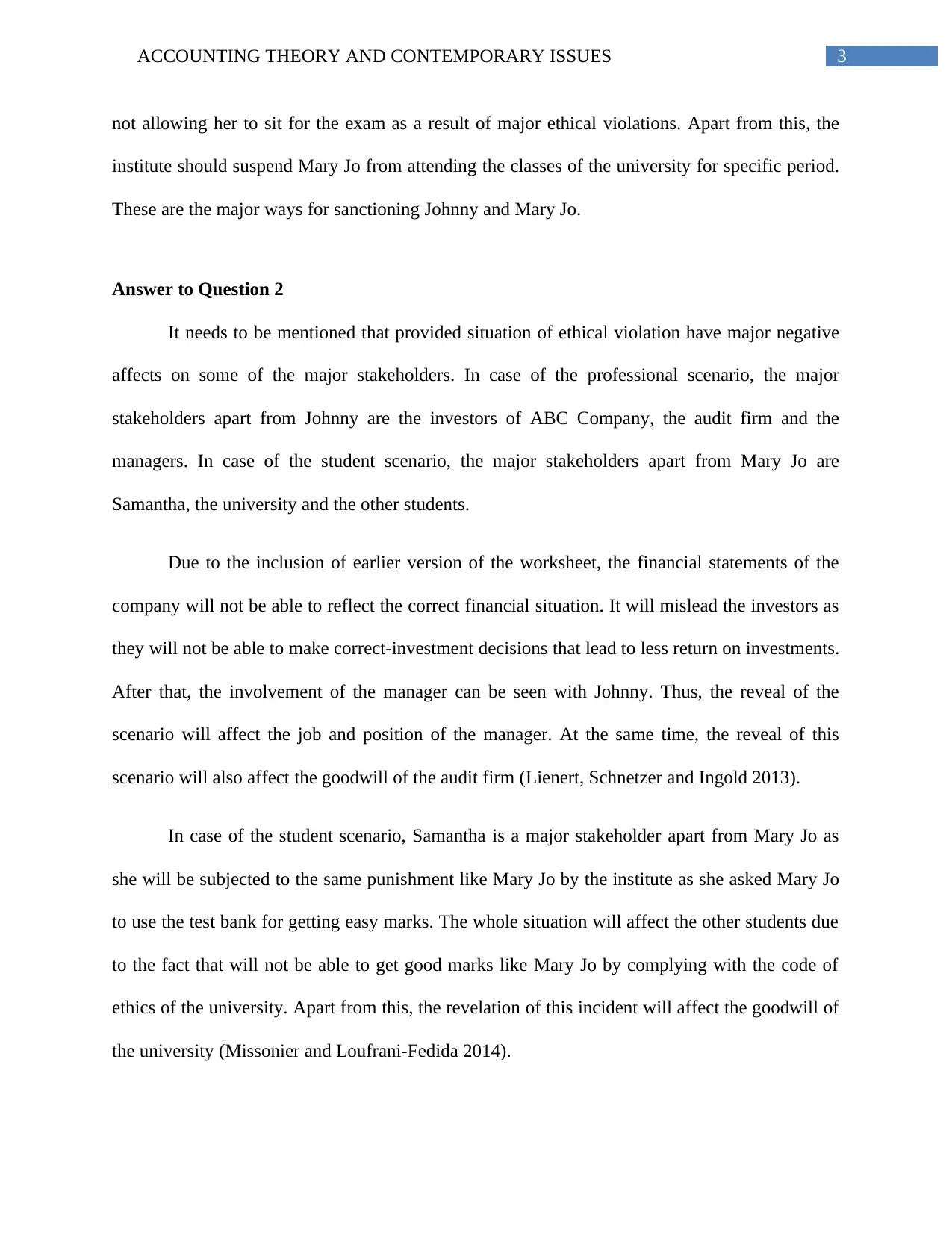
3ACCOUNTING THEORY AND CONTEMPORARY ISSUES
not allowing her to sit for the exam as a result of major ethical violations. Apart from this, the
institute should suspend Mary Jo from attending the classes of the university for specific period.
These are the major ways for sanctioning Johnny and Mary Jo.
Answer to Question 2
It needs to be mentioned that provided situation of ethical violation have major negative
affects on some of the major stakeholders. In case of the professional scenario, the major
stakeholders apart from Johnny are the investors of ABC Company, the audit firm and the
managers. In case of the student scenario, the major stakeholders apart from Mary Jo are
Samantha, the university and the other students.
Due to the inclusion of earlier version of the worksheet, the financial statements of the
company will not be able to reflect the correct financial situation. It will mislead the investors as
they will not be able to make correct-investment decisions that lead to less return on investments.
After that, the involvement of the manager can be seen with Johnny. Thus, the reveal of the
scenario will affect the job and position of the manager. At the same time, the reveal of this
scenario will also affect the goodwill of the audit firm (Lienert, Schnetzer and Ingold 2013).
In case of the student scenario, Samantha is a major stakeholder apart from Mary Jo as
she will be subjected to the same punishment like Mary Jo by the institute as she asked Mary Jo
to use the test bank for getting easy marks. The whole situation will affect the other students due
to the fact that will not be able to get good marks like Mary Jo by complying with the code of
ethics of the university. Apart from this, the revelation of this incident will affect the goodwill of
the university (Missonier and Loufrani-Fedida 2014).
not allowing her to sit for the exam as a result of major ethical violations. Apart from this, the
institute should suspend Mary Jo from attending the classes of the university for specific period.
These are the major ways for sanctioning Johnny and Mary Jo.
Answer to Question 2
It needs to be mentioned that provided situation of ethical violation have major negative
affects on some of the major stakeholders. In case of the professional scenario, the major
stakeholders apart from Johnny are the investors of ABC Company, the audit firm and the
managers. In case of the student scenario, the major stakeholders apart from Mary Jo are
Samantha, the university and the other students.
Due to the inclusion of earlier version of the worksheet, the financial statements of the
company will not be able to reflect the correct financial situation. It will mislead the investors as
they will not be able to make correct-investment decisions that lead to less return on investments.
After that, the involvement of the manager can be seen with Johnny. Thus, the reveal of the
scenario will affect the job and position of the manager. At the same time, the reveal of this
scenario will also affect the goodwill of the audit firm (Lienert, Schnetzer and Ingold 2013).
In case of the student scenario, Samantha is a major stakeholder apart from Mary Jo as
she will be subjected to the same punishment like Mary Jo by the institute as she asked Mary Jo
to use the test bank for getting easy marks. The whole situation will affect the other students due
to the fact that will not be able to get good marks like Mary Jo by complying with the code of
ethics of the university. Apart from this, the revelation of this incident will affect the goodwill of
the university (Missonier and Loufrani-Fedida 2014).
Paraphrase This Document
Need a fresh take? Get an instant paraphrase of this document with our AI Paraphraser
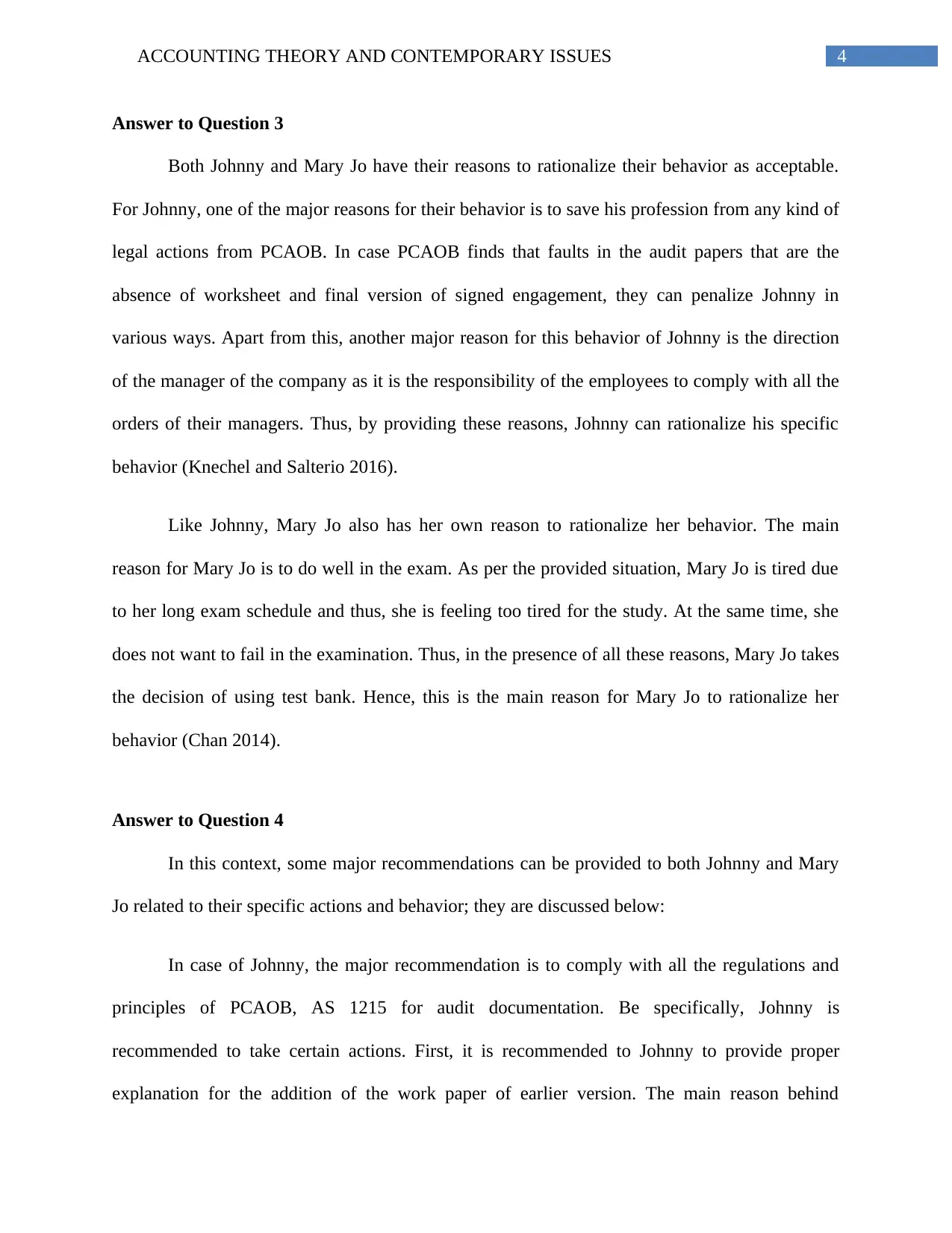
4ACCOUNTING THEORY AND CONTEMPORARY ISSUES
Answer to Question 3
Both Johnny and Mary Jo have their reasons to rationalize their behavior as acceptable.
For Johnny, one of the major reasons for their behavior is to save his profession from any kind of
legal actions from PCAOB. In case PCAOB finds that faults in the audit papers that are the
absence of worksheet and final version of signed engagement, they can penalize Johnny in
various ways. Apart from this, another major reason for this behavior of Johnny is the direction
of the manager of the company as it is the responsibility of the employees to comply with all the
orders of their managers. Thus, by providing these reasons, Johnny can rationalize his specific
behavior (Knechel and Salterio 2016).
Like Johnny, Mary Jo also has her own reason to rationalize her behavior. The main
reason for Mary Jo is to do well in the exam. As per the provided situation, Mary Jo is tired due
to her long exam schedule and thus, she is feeling too tired for the study. At the same time, she
does not want to fail in the examination. Thus, in the presence of all these reasons, Mary Jo takes
the decision of using test bank. Hence, this is the main reason for Mary Jo to rationalize her
behavior (Chan 2014).
Answer to Question 4
In this context, some major recommendations can be provided to both Johnny and Mary
Jo related to their specific actions and behavior; they are discussed below:
In case of Johnny, the major recommendation is to comply with all the regulations and
principles of PCAOB, AS 1215 for audit documentation. Be specifically, Johnny is
recommended to take certain actions. First, it is recommended to Johnny to provide proper
explanation for the addition of the work paper of earlier version. The main reason behind
Answer to Question 3
Both Johnny and Mary Jo have their reasons to rationalize their behavior as acceptable.
For Johnny, one of the major reasons for their behavior is to save his profession from any kind of
legal actions from PCAOB. In case PCAOB finds that faults in the audit papers that are the
absence of worksheet and final version of signed engagement, they can penalize Johnny in
various ways. Apart from this, another major reason for this behavior of Johnny is the direction
of the manager of the company as it is the responsibility of the employees to comply with all the
orders of their managers. Thus, by providing these reasons, Johnny can rationalize his specific
behavior (Knechel and Salterio 2016).
Like Johnny, Mary Jo also has her own reason to rationalize her behavior. The main
reason for Mary Jo is to do well in the exam. As per the provided situation, Mary Jo is tired due
to her long exam schedule and thus, she is feeling too tired for the study. At the same time, she
does not want to fail in the examination. Thus, in the presence of all these reasons, Mary Jo takes
the decision of using test bank. Hence, this is the main reason for Mary Jo to rationalize her
behavior (Chan 2014).
Answer to Question 4
In this context, some major recommendations can be provided to both Johnny and Mary
Jo related to their specific actions and behavior; they are discussed below:
In case of Johnny, the major recommendation is to comply with all the regulations and
principles of PCAOB, AS 1215 for audit documentation. Be specifically, Johnny is
recommended to take certain actions. First, it is recommended to Johnny to provide proper
explanation for the addition of the work paper of earlier version. The main reason behind
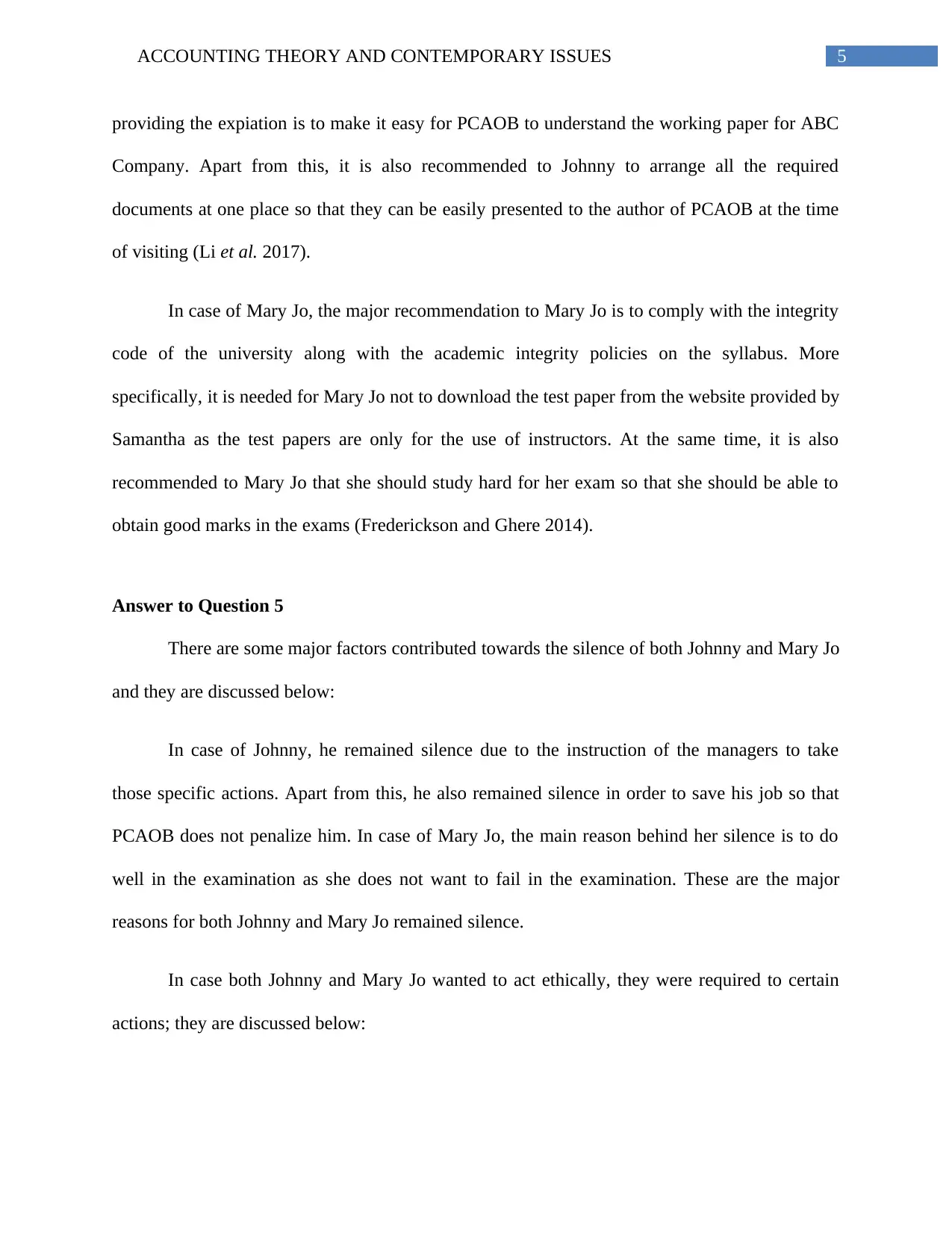
5ACCOUNTING THEORY AND CONTEMPORARY ISSUES
providing the expiation is to make it easy for PCAOB to understand the working paper for ABC
Company. Apart from this, it is also recommended to Johnny to arrange all the required
documents at one place so that they can be easily presented to the author of PCAOB at the time
of visiting (Li et al. 2017).
In case of Mary Jo, the major recommendation to Mary Jo is to comply with the integrity
code of the university along with the academic integrity policies on the syllabus. More
specifically, it is needed for Mary Jo not to download the test paper from the website provided by
Samantha as the test papers are only for the use of instructors. At the same time, it is also
recommended to Mary Jo that she should study hard for her exam so that she should be able to
obtain good marks in the exams (Frederickson and Ghere 2014).
Answer to Question 5
There are some major factors contributed towards the silence of both Johnny and Mary Jo
and they are discussed below:
In case of Johnny, he remained silence due to the instruction of the managers to take
those specific actions. Apart from this, he also remained silence in order to save his job so that
PCAOB does not penalize him. In case of Mary Jo, the main reason behind her silence is to do
well in the examination as she does not want to fail in the examination. These are the major
reasons for both Johnny and Mary Jo remained silence.
In case both Johnny and Mary Jo wanted to act ethically, they were required to certain
actions; they are discussed below:
providing the expiation is to make it easy for PCAOB to understand the working paper for ABC
Company. Apart from this, it is also recommended to Johnny to arrange all the required
documents at one place so that they can be easily presented to the author of PCAOB at the time
of visiting (Li et al. 2017).
In case of Mary Jo, the major recommendation to Mary Jo is to comply with the integrity
code of the university along with the academic integrity policies on the syllabus. More
specifically, it is needed for Mary Jo not to download the test paper from the website provided by
Samantha as the test papers are only for the use of instructors. At the same time, it is also
recommended to Mary Jo that she should study hard for her exam so that she should be able to
obtain good marks in the exams (Frederickson and Ghere 2014).
Answer to Question 5
There are some major factors contributed towards the silence of both Johnny and Mary Jo
and they are discussed below:
In case of Johnny, he remained silence due to the instruction of the managers to take
those specific actions. Apart from this, he also remained silence in order to save his job so that
PCAOB does not penalize him. In case of Mary Jo, the main reason behind her silence is to do
well in the examination as she does not want to fail in the examination. These are the major
reasons for both Johnny and Mary Jo remained silence.
In case both Johnny and Mary Jo wanted to act ethically, they were required to certain
actions; they are discussed below:
⊘ This is a preview!⊘
Do you want full access?
Subscribe today to unlock all pages.

Trusted by 1+ million students worldwide
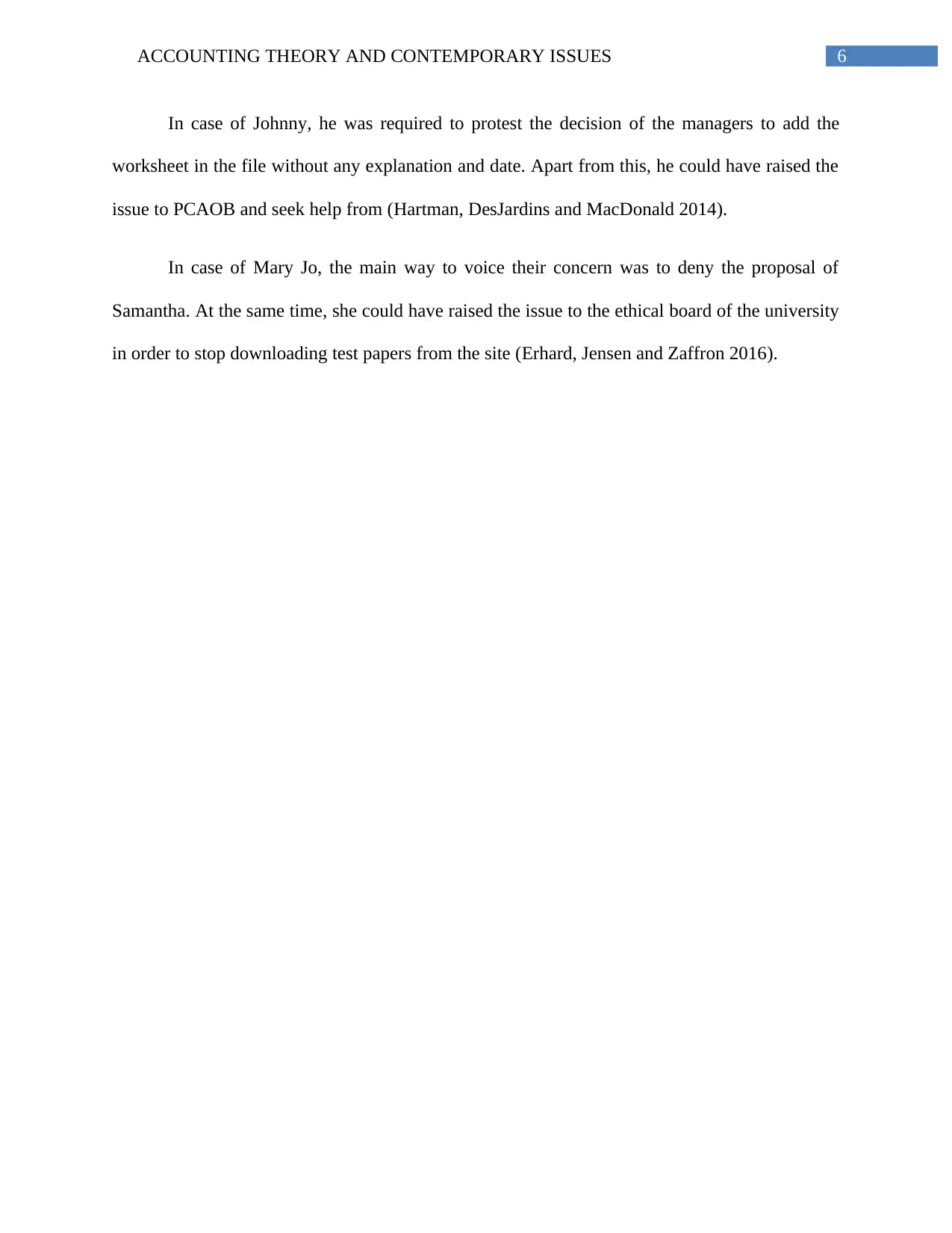
6ACCOUNTING THEORY AND CONTEMPORARY ISSUES
In case of Johnny, he was required to protest the decision of the managers to add the
worksheet in the file without any explanation and date. Apart from this, he could have raised the
issue to PCAOB and seek help from (Hartman, DesJardins and MacDonald 2014).
In case of Mary Jo, the main way to voice their concern was to deny the proposal of
Samantha. At the same time, she could have raised the issue to the ethical board of the university
in order to stop downloading test papers from the site (Erhard, Jensen and Zaffron 2016).
In case of Johnny, he was required to protest the decision of the managers to add the
worksheet in the file without any explanation and date. Apart from this, he could have raised the
issue to PCAOB and seek help from (Hartman, DesJardins and MacDonald 2014).
In case of Mary Jo, the main way to voice their concern was to deny the proposal of
Samantha. At the same time, she could have raised the issue to the ethical board of the university
in order to stop downloading test papers from the site (Erhard, Jensen and Zaffron 2016).
Paraphrase This Document
Need a fresh take? Get an instant paraphrase of this document with our AI Paraphraser
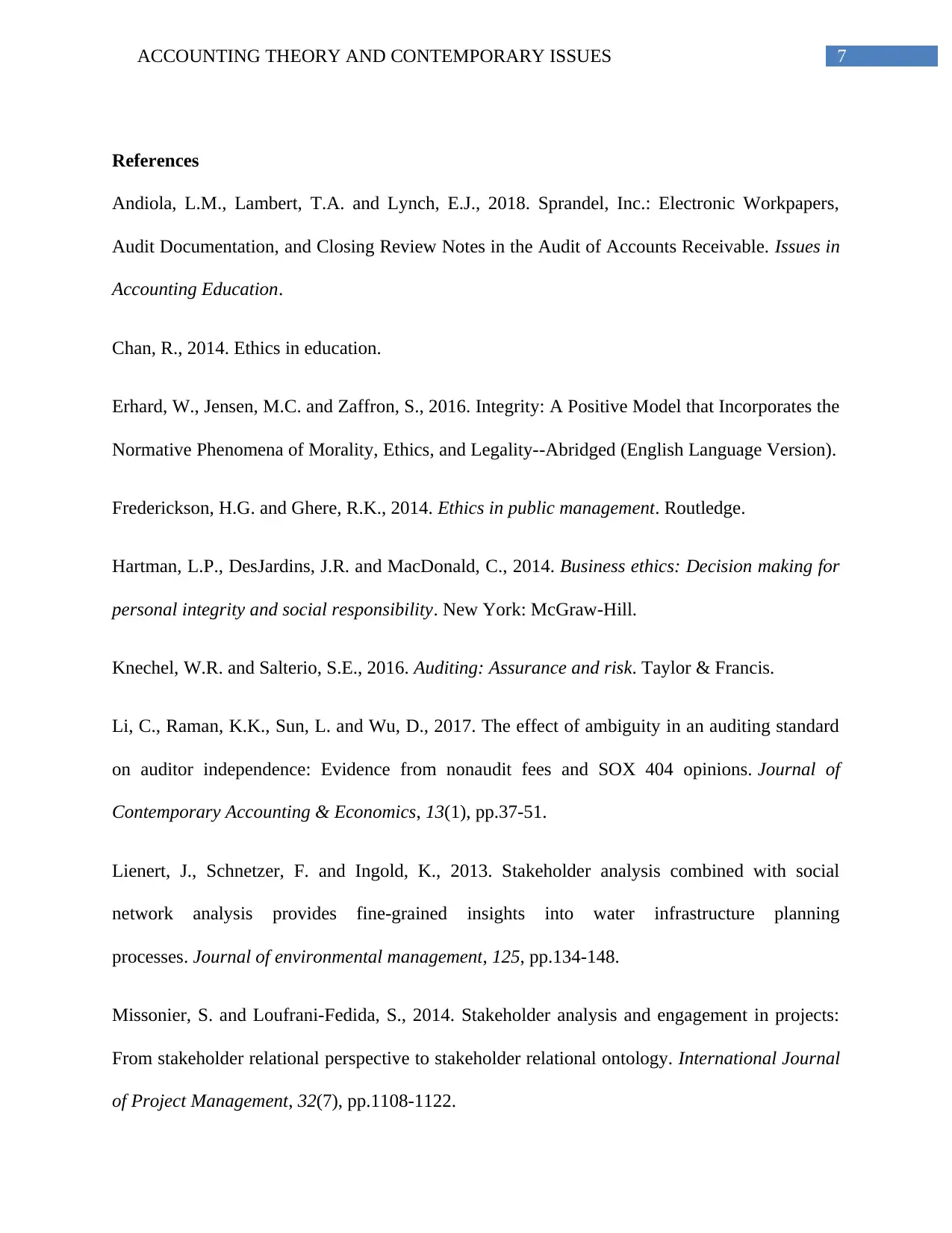
7ACCOUNTING THEORY AND CONTEMPORARY ISSUES
References
Andiola, L.M., Lambert, T.A. and Lynch, E.J., 2018. Sprandel, Inc.: Electronic Workpapers,
Audit Documentation, and Closing Review Notes in the Audit of Accounts Receivable. Issues in
Accounting Education.
Chan, R., 2014. Ethics in education.
Erhard, W., Jensen, M.C. and Zaffron, S., 2016. Integrity: A Positive Model that Incorporates the
Normative Phenomena of Morality, Ethics, and Legality--Abridged (English Language Version).
Frederickson, H.G. and Ghere, R.K., 2014. Ethics in public management. Routledge.
Hartman, L.P., DesJardins, J.R. and MacDonald, C., 2014. Business ethics: Decision making for
personal integrity and social responsibility. New York: McGraw-Hill.
Knechel, W.R. and Salterio, S.E., 2016. Auditing: Assurance and risk. Taylor & Francis.
Li, C., Raman, K.K., Sun, L. and Wu, D., 2017. The effect of ambiguity in an auditing standard
on auditor independence: Evidence from nonaudit fees and SOX 404 opinions. Journal of
Contemporary Accounting & Economics, 13(1), pp.37-51.
Lienert, J., Schnetzer, F. and Ingold, K., 2013. Stakeholder analysis combined with social
network analysis provides fine-grained insights into water infrastructure planning
processes. Journal of environmental management, 125, pp.134-148.
Missonier, S. and Loufrani-Fedida, S., 2014. Stakeholder analysis and engagement in projects:
From stakeholder relational perspective to stakeholder relational ontology. International Journal
of Project Management, 32(7), pp.1108-1122.
References
Andiola, L.M., Lambert, T.A. and Lynch, E.J., 2018. Sprandel, Inc.: Electronic Workpapers,
Audit Documentation, and Closing Review Notes in the Audit of Accounts Receivable. Issues in
Accounting Education.
Chan, R., 2014. Ethics in education.
Erhard, W., Jensen, M.C. and Zaffron, S., 2016. Integrity: A Positive Model that Incorporates the
Normative Phenomena of Morality, Ethics, and Legality--Abridged (English Language Version).
Frederickson, H.G. and Ghere, R.K., 2014. Ethics in public management. Routledge.
Hartman, L.P., DesJardins, J.R. and MacDonald, C., 2014. Business ethics: Decision making for
personal integrity and social responsibility. New York: McGraw-Hill.
Knechel, W.R. and Salterio, S.E., 2016. Auditing: Assurance and risk. Taylor & Francis.
Li, C., Raman, K.K., Sun, L. and Wu, D., 2017. The effect of ambiguity in an auditing standard
on auditor independence: Evidence from nonaudit fees and SOX 404 opinions. Journal of
Contemporary Accounting & Economics, 13(1), pp.37-51.
Lienert, J., Schnetzer, F. and Ingold, K., 2013. Stakeholder analysis combined with social
network analysis provides fine-grained insights into water infrastructure planning
processes. Journal of environmental management, 125, pp.134-148.
Missonier, S. and Loufrani-Fedida, S., 2014. Stakeholder analysis and engagement in projects:
From stakeholder relational perspective to stakeholder relational ontology. International Journal
of Project Management, 32(7), pp.1108-1122.
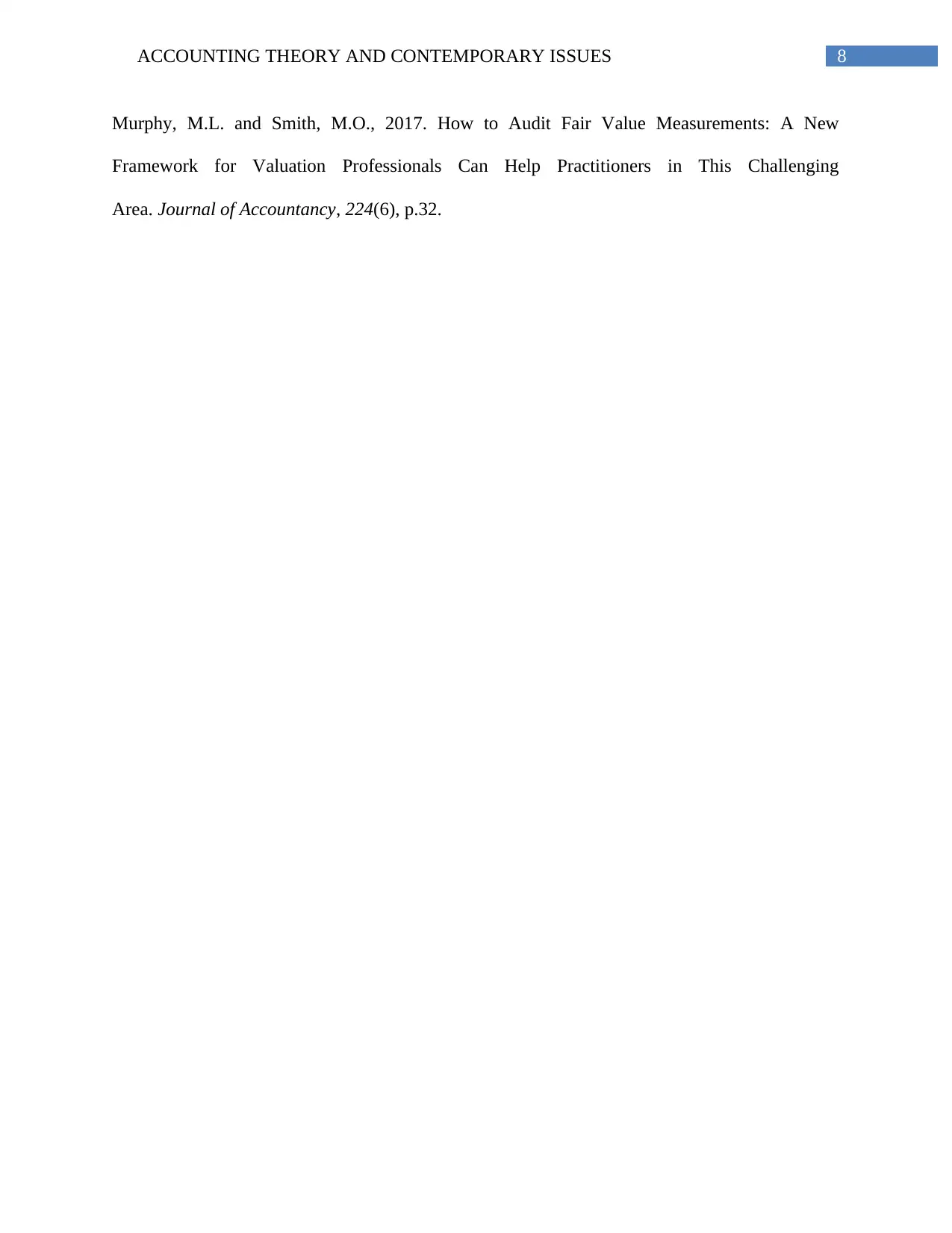
8ACCOUNTING THEORY AND CONTEMPORARY ISSUES
Murphy, M.L. and Smith, M.O., 2017. How to Audit Fair Value Measurements: A New
Framework for Valuation Professionals Can Help Practitioners in This Challenging
Area. Journal of Accountancy, 224(6), p.32.
Murphy, M.L. and Smith, M.O., 2017. How to Audit Fair Value Measurements: A New
Framework for Valuation Professionals Can Help Practitioners in This Challenging
Area. Journal of Accountancy, 224(6), p.32.
⊘ This is a preview!⊘
Do you want full access?
Subscribe today to unlock all pages.

Trusted by 1+ million students worldwide
1 out of 9
Related Documents
Your All-in-One AI-Powered Toolkit for Academic Success.
+13062052269
info@desklib.com
Available 24*7 on WhatsApp / Email
![[object Object]](/_next/static/media/star-bottom.7253800d.svg)
Unlock your academic potential
Copyright © 2020–2026 A2Z Services. All Rights Reserved. Developed and managed by ZUCOL.




